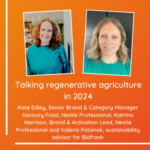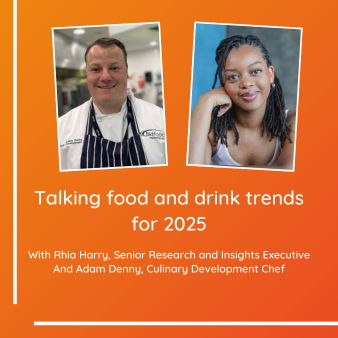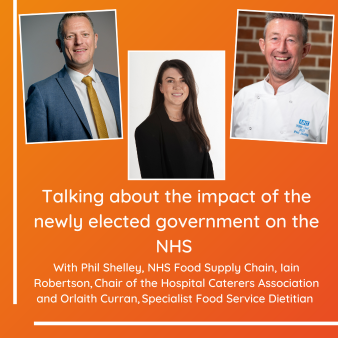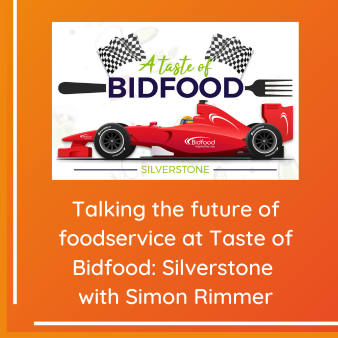
Talking Regenerative Agriculture in 2024 with Nestle
Join host Ashley Hollidge and co-host Valeria Potsinok to discuss the exciting and developing world of regenerative agriculture in 2024.
We are joined by special guests Kate Edley, Brand and Category Lead Savoury Food, Nestlé Professional and Katrina Harrison Brand and Activation Lead, Nestlé Professional, who breakdown the complex world of regenerative farming and dive deep into it’s importance to the future of foodservice. Whether you’re new to the topic of Regenerative Farming, are an expert or just curious about this topic we hope you will find this an interesting discussion.
Click here to read Bidfood’s 2023 sustainability report: Bidfood Sustainability Report 2023
Join host Ashley Hollidge and co-host Valeria Potsinok to discuss the exciting and developing world of regenerative agriculture in 2024.
We are joined by special guests Kate Edley, Brand and Category Lead Savoury Food, Nestlé Professional and Katrina Harrison Brand and Activation Lead, Nestlé Professional, who breakdown the complex world of regenerative farming and dive deep into it’s importance to the future of foodservice. Whether you’re new to the topic of Regenerative Farming, are an expert or just curious about this topic we hope you will find this an interesting discussion.
Click here to read Bidfood’s 2023 sustainability report: Bidfood Sustainability Report 2023
If you are keen to learn more about Regenerative Agriculture, and how Nestlé are supporting are supporting farmers and please see below for additional sources of information.
Nestlé Regenerative Agriculture regenerative-agriculture.pdf (nestle.com)
Nestlé Milk Plan, YouTube Is Regenerative The Future of Farming? (youtube.com)
Nestlé Milk Plan, YouTube Shorts Is Regenerative the Future of Farming? (youtube.com)
Nestlé Milk Plan, Julie Oust Blog, What I learned about regenerative farming – Julie Owst | Bidfood
First Milk, British farmer-owned dairy co-operative First Milk – The Regenerative Co-op
Participants
Host: Ashley Hollidge AshleyHollidge@bidfood.co.uk, Customer Marketing Executive, Bidfood
Co-host: Valeria Potsinok ValeriaPotsinok@bidfood.co.uk , Sustainability Advisor, Bidfresh
Guest: Kate Edley Kate.Edley@Uk.nestle.com Brand and Category Lead Savoury Food, Nestlé Professional
Guest: Katrina Harrison Katrina.Harrison@UK.nestle.com, Brand and Activation Lead, Nestlé Professional
Timestamp 2:01
1. What is Regenerative Agriculture?
Kate Edley Kate.Edley@Uk.nestle.com Brand and Category Lead Savoury Food, Nestlé Professional
While the term ‘regenerative agriculture’ might be relatively new or seeing a resurgence, it’s not a new concept, it’s simply an approach to farming that aims to improve soil health and soil fertility – as well as protecting water resources and biodiversity. It is about farming in closer harmony with nature and allowing natural ecosystems to regenerate and flourish. Always putting the farmer at the centre.
The main pillars of regenerative agriculture are:
- Promoting soil health
- Increasing biodiversity
- Integrate livestock, where feasible
- Water management
- Ensuring all efforts are Farmer-centric
- Context appropriate
Timestamp 6.19
2. What are the main challenges to regenerative agriculture in Nestlé’s experience, and what are the main lessons learnt?
Katrina Harrison Katrina.Harrison@UK.nestle.com, Brand and Activation Lead, Nestlé Professional
One of the key challenges we have had to overcome are the short-term economic benefits. One of the toughest jobs we have is to remind everyone to be patient. Businesses tend to want an return on investment (ROI) of three years or less, but that’s challenging to achieve with regenerative agriculture. On some farms, emissions may go up before they go down and yields can decrease in the short term, so we really need to take a long-term view and keep reminding everyone of that.
This is why we need to make the case to farmers really compelling to give them the confidence that we will support them both in the short term and longer term to make the transition.
The second key opportunity is ensuring we drive collaboration across the supply chain. We need to collaborate more with our farmers within our supply chain to find the best practices to reduce carbon, benefit the farmer and biodiversity to ensure we’re all sharing and learning from each other to accelerate the initiatives that really deliver the greatest results. When we talk about regenerative farming we obviously look at the health of the soil but we also look at the social aspects of impacting each farm too.
Given our diverse portfolio, the initiatives implemented to support coffee farmers in Brazil or Vietnam are going to be very different to how we support our dairy or wheat farmers in the UK so it’s a complex ecosystem. This is why we focus on the key pillars that needs to be delivered through regenerative agriculture such as improving soil health, maintaining and restoring diverse ecosystems and safeguarding water resources, whilst also ensuring that regenerative agriculture is rolled out in a fashion that is farmer led – they know the land and what will work for them, so their input is crucial.
Timestamp 8.56
3. Why is supporting farmers on their transition to regenerative agriculture important for both the journey to net zero & the future of foodservice?
Kate Edley Kate.Edley@Uk.nestle.com Brand and Category Lead Savoury Food, Nestlé Professional
For most food businesses, when reviewing the full value chain, “from farm to fork” the upstream emissions from agriculture make up most of their emissions footprint. For Nestlé, over two thirds of emissions are from farming and sourcing our ingredients, and so to reach net zero we must focus on this part of our value chain.
For companies involved in foodservice, these agricultural emissions are typically outside of our direct control, they are coming from suppliers, both direct and indirect and are referred to as ‘Scope 3’ emissions. Since we only have direct control of our own operations and so it is vital to try to pull together and collaborate with others up and down the value chain to make a difference.
By putting farmers at the heart of this transition and working with farmers it is possible to reduce carbon emissions by drawing carbon into the soil. Regenerative agriculture also supports to make their farms more resilient to future climate driven weather patterns.
Farmers must be supported now, and over the long term through the transition to more regenerative practices, particularly as there can be short-term negative impacts. Such support can be technical, financial, or facilitating the sharing of information. Globally, by 2025 Nestlé will have invested 1.2bn CHF in supporting this transition.
Timestamp 13.16
Valeria Potsinok ValeriaPotsinok@bidfood.co.uk , Sustainability Advisor, Bidfood
Farmers are stewards of our natural resources, they are feeding us all but they are often at some of the highest risk of climate change impacts. We are asking farmers to change their methods 20+ years, to change their livelihoods, so support is critical to support mitigating these risks and a smooth transition.
Agriculture and farming has a high potential to support carbon sequestration and nature restoration and therefore can be a great support towards net zero and resilience of our food system.
Timestamp 14.35
4. How is Nestlé Professional working with farmers, right here in the UK and further afield, and give the farmers perspective?
Katrina Harrison Katrina.Harrison@UK.nestle.com, Brand and Activation Lead, Nestlé Professional
Here in the UK, one of our focus areas is on milk and dairy ingredients that go into products like KitKat and our frothy Nescafe coffees.
In 2003, Nestlé established our relationship with First Milk, the farmer-owned dairy co-operative based in Ayrshire and Cumbria. Through the partnership we work with 80 farmers who us with provide high-quality fresh milk.
Our goal, and that of First Milk, is to lessen environmental impact by improving the sustainability and efficiency of the supply chain. Each farmer receives a ’sustainability bonus’ for taking practical measures that protect and enhance natural assets on their land.
Examples include increasing the biodiversity of farmland, reducing single use and increasing recycled plastics and encouraging digital innovation which could be utilising cow monitors and other technology to provide information about the environmental impact and animal welfare standards. The scheme also focuses on the social aspect of agriculture, so we incentivise school visits to help children better understand food, farming and the environment, while also encouraging more women and young people into the industry.
The plan is on track to reduce the emissions from our milk sourcing by 50% by 2026.
We will not tackle climate change and future of food security if we don’t work with farmers, they are really key. However, we have to remember this is farmers livelihoods – we’re asking them to fundamentally change their business and that’s a big ask. We have enabled them to join us on a journey to become more regenerative, allowing them to go at their own pace. We’ve encouraged them to implement practices which are win-win and therefore they have embraced the whole concept much more willingly than perhaps other groups.
Having spoken to a farmer during our trip to Howes Farm in Cumbria, one of the messages that came out really strongly was the long-term support that’s required. Richard, the farmer mentioned that Nestlé’s input with First Milk with the Nestlé Nestlé Milk Plan has given them the confidence that they’re not on their own. The investment has allowed progress to accelerate, allowing more farms to make the transition and speed up learning by providing a financial safety net. This is hugely important as during the transition period yields and financial returns can potentially drop, so we need to give farmers the peace of mind as it may take a couple of years to break even before they can begin to see greater profitability over the longer term.
Timestamp 19:00
5. Is there anything foodservice organisations can do better when collaborating to move faster towards regenerative agriculture?
Valeria Potsinok ValeriaPotsinok@bidfood.co.uk , Sustainability Advisor, Bidfood
There are things that foodservice companies can to do support this transition, for example having a well sourcing strategy that integrates regenerative practices. Those strategies should include ambitious commitments and should seek out suppliers who are aligned to this strategy.
Also, to equip their internal teams and employees with training, giving them right resources and learning materials to support their learning, to create a motivated and strong culture towards sustainable transformation.
Finally, we need to collaborate and build partnerships along the full value chain, from farmers, through manufacturers, wholesalers through to customers and consumers. It’s very hard to drive change alone and such a major food system transformation always requires a co-development of solutions.
Timestamp 21:05
Katrina Harrison Katrina.Harrison@UK.nestle.com, Brand and Activation Lead, Nestlé Professional
One of the most successful initiatives we’ve initiated in helping both our own internal teams and our customers better understand how we’re implementing regenerative agriculture has been achieved by taking people out onto the dairy farms that supply Nestlé with milk.
The topic of regenerative agriculture can seem incredibly complex on paper, but when you take people out onto the farm it is so much easier to demonstrate how it really is taking things back to nature and trying to mimic nature in its natural form. It becomes so much easier to envisage what we’re trying to achieve and how those initiatives are brought to life, whether that’s seeing the hedgerows which have been planted or digging up small patches of earth to count the vast number of earthworms.
It helps bring to life what it’s all about, and when people see it for themselves it almost becomes a light bulb moment and really helps them to understand what we’re trying to deliver.
Timestamp 22:01
Valeria Potsinok ValeriaPotsinok@bidfood.co.uk , Sustainability Advisor, Bidfood
I definitely agree. It can be quite a scary topic if you think about it without seeing it yourself. Just hearing the words regenerative agriculture, people can get quite confused as to what it actually means but when they see it in practice on the farm, something as simple as letting your livestock graze on the same field where you’ve grown crops – that’s considered regenerative agriculture practice. I think that opens a lot of eyes and people take it in a bit more easily.
Timestamp 22:45
6. What are our Bidfood customers and ultimately their consumers asking for when it comes to regenerative agriculture?
Valeria Potsinok ValeriaPotsinok@bidfood.co.uk , Sustainability Advisor, Bidfood
Regenerative farming is a hot topic, we see a huge growth in demand for information on the practices whether suppliers are involved. More customers and general public are now asking question on how regenerative agriculture can support nature restoration and carbon sequestration. Our customer are asking not just about carbon savings, but also about biodiversity, water management and farmer stewardship, which is great to see at it goes beyond carbon sequestration, removing the carbon tunnel vision to look beyond.
Timestamp 24:37
7. Following Bidfood 2023 Sustainability Report, what are Bidfood doing in the world of sustainability for 2024
Valeria Potsinok ValeriaPotsinok@bidfood.co.uk , Sustainability Advisor, Bidfood
Bidfood are continuing progress on the Food waste action and food waste action in general. One of the bigger target is around Carbon emission reduction and journey to net zero. There is a Carbon Labelling project that the Bidfood team are working on.
Also not ignoring the more holistic view of sustainability, investigating opportunities in biodiversity, circular economy, regenerative farming. Also looking at ways to engage with employees, customers and suppliers. So lots of things covered in the future report.
Timestamp 25:39
Final thoughts from Nestlé Professional
Kate Edley Kate.Edley@Uk.nestle.com Brand and Category Lead Savoury Food, Nestlé Professional
How can the conversation continue?Everyone can and needs to play their part, for example to share learnings. Everyone in food service can try to work with suppliers to make more sustainable choices, ask questions, perhaps visiting a farm, listen to podcasts like this. Keep listening, learning and talking about these topics.
Timestamp 26:07
Thank you!








